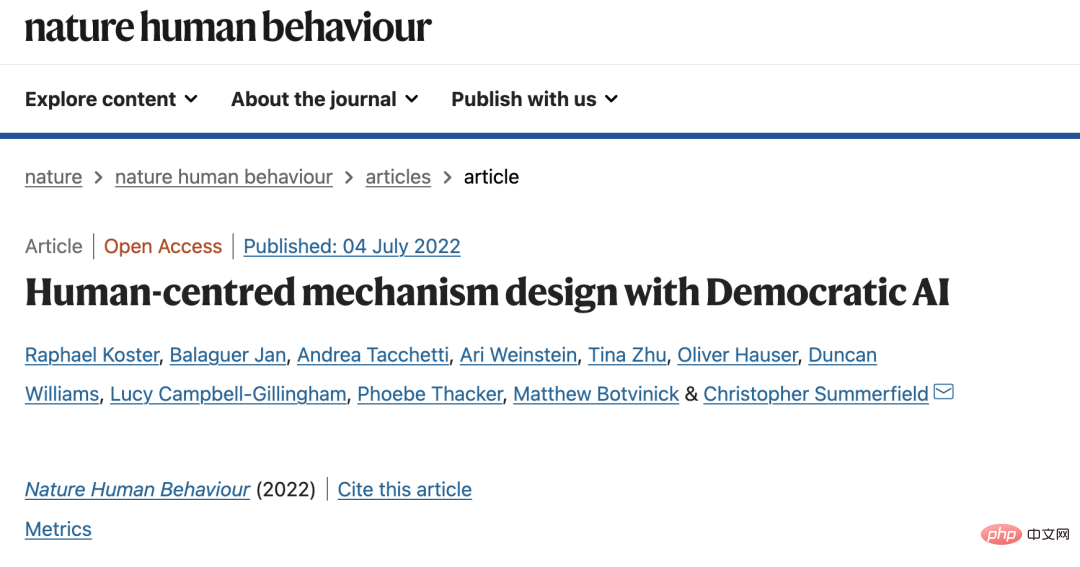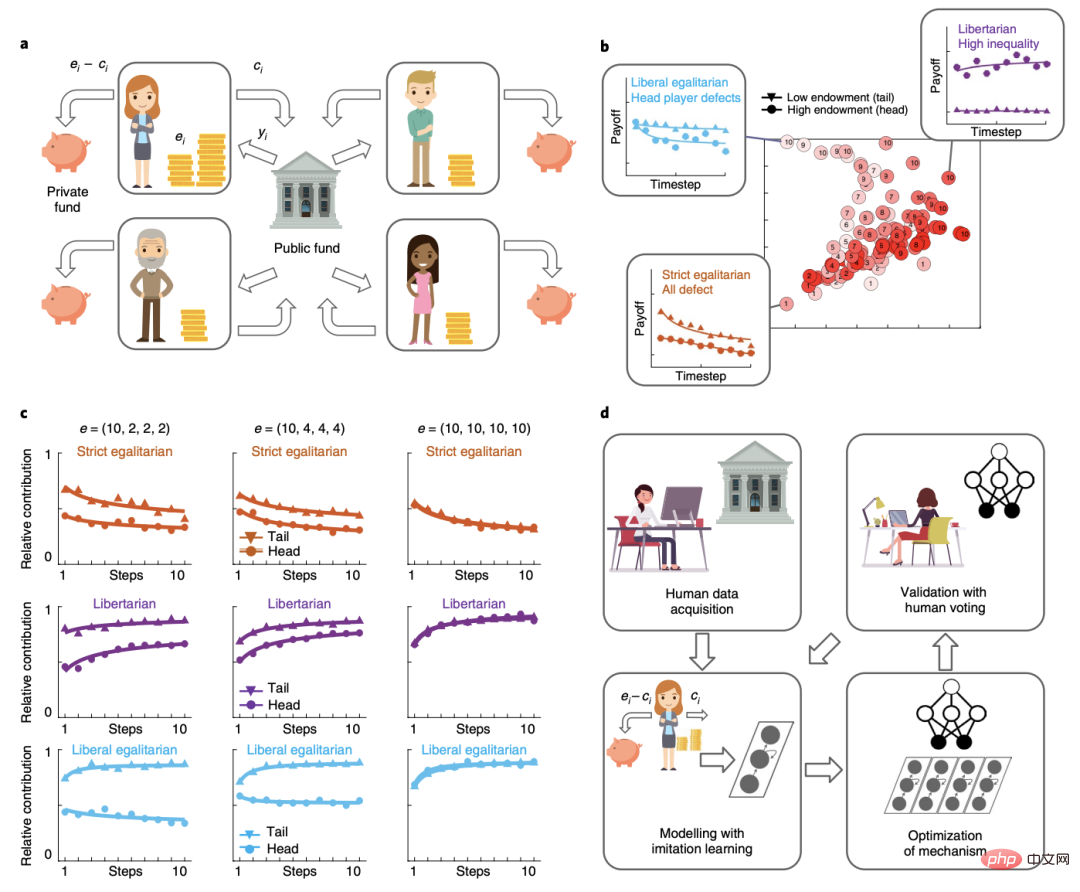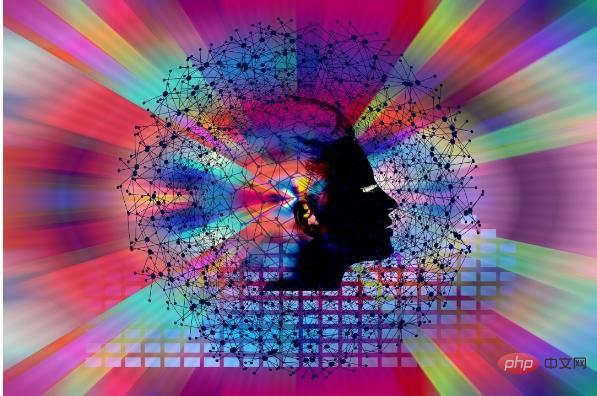 Technology peripherals
Technology peripherals
 AI
AI
 DeepMind's latest research: AI defeats humans and designs a better economic mechanism|Nature sub-journal
DeepMind's latest research: AI defeats humans and designs a better economic mechanism|Nature sub-journal
DeepMind's latest research: AI defeats humans and designs a better economic mechanism|Nature sub-journal
Can artificial intelligence (AI) push human society into a truly intelligent era?
Although after more than 60 years of development, the artificial intelligence industry has made breakthrough progress and is widely used in all aspects of economy and society, building an artificial intelligence system that is consistent with human values is still an unresolved issue. The problem.
Now, a latest study from the British artificial intelligence company DeepMind may provide a new way of thinking for practitioners in the artificial intelligence industry to solve this problem.
According to reports, DeepMind’s artificial intelligence system not only learned to formulate policies on how to reallocate public funds by learning from more than 4,000 people and in computer simulations in a 4-player online economic game, but also performed Very good, beating other human players.
The game involves players deciding whether to keep a monetary donation or share it with others for the collective good.
The relevant research paper, entitled "Human-centred mechanism design with Democratic AI", was published online on July 5 in the authoritative scientific journal Nature Human Behavior .

##Source: Nature Human Behavior
Annette Zimmermann, assistant professor at the University of York in the United Kingdom, warned, "Don't narrowly equate democracy with a 'preference satisfaction' system that finds the most popular policies."
She also said that democracy is not just about getting the best possible implementation of your favorite policies - it is about creating a process in which citizens can engage and deliberate with each other as equals.
The ultimate goal of artificial intelligence research is to build technologies that benefit humanity—from helping us complete daily tasks to solving major problems facing society Survival challenge.
Today, machine learning systems have solved major problems in biomedicine and helped humans deal with environmental challenges. However, the applications of artificial intelligence in helping humans design fair and prosperous societies have yet to be developed.
In economics and game theory, a field called mechanism design studies how to optimally control the flow of wealth, information, or power among incentivized actors to achieve desired goals.
In this work, the research team tried to prove that deep reinforcement learning (RL) agents can be used to design an economic mechanism that can obtain the preferences of the motivated population.
In this game, players start with different amounts of money and must decide how much to contribute to help better develop a public fund pool, and eventually receive a portion in return, and will involve repeated decisions about whether to keep a Make a monetary donation or share it with other players for potential collective benefit.
The research team trained a deep reinforcement learning agent to design a redistribution mechanism that shares funds to players under conditions of equality and inequality of wealth.
Shared revenue is returned to players through two different redistribution mechanisms, one designed by the artificial intelligence system and the other designed by humans.

##Picture|Game Design (Source: Nature Human Behavior)
In the policy formulated by artificial intelligence, the system will reduce the wealth gap between players by reallocating public funds according to the amount of start-up capital contributed by each player. However, the research team also warned that their research results do not represent a recipe for "AI government", nor do they intend to build some artificial intelligence-driven policies specifically for policy making. Tool of. The findings show that artificial intelligence systems can be trained to meet democratic goals by designing a mechanism that humans significantly prefer in an incentive-compatible economic game. Source: Pixabay Another open question Yes, will people trust the mechanisms designed by artificial intelligence systems. If the identity of the referee is known in advance, players may prefer a human referee to an AI acting referee. However, people also tend to trust AI systems when they believe a task is too complex for humans. Is it trustworthy?
In this work, the research team used artificial intelligence techniques to learn reallocation schemes from scratch, an approach that eases the burden on artificial intelligence researchers - who themselves may be biased or not representative of the broader population - The burden of choosing a domain-specific target for optimization.
This research effort also raises several questions, some of which are theoretically challenging. For example, one might ask whether it is a good idea to emphasize democratic goals as a method of value calibration. The AI system may have inherited a tendency from other democratic methods to “empower the many at the expense of the few.” This is particularly important given the pressing concerns that AI could be deployed in ways that exacerbate existing bias, discrimination or inequity in society. 

Also, would players react differently if these mechanics were explained to them verbally, rather than learned through experience. A large body of literature shows that people sometimes behave differently, especially with regard to risky choices, when mechanisms are described "based on description" rather than "based on experience." However, the mechanisms designed by AI may not always be expressible in words, in which case it seems likely that the observed behavior will depend entirely on the choice of description adopted by the research team.
At the end of the paper, the research team also emphasized this finding and stated that they support some form of "artificial intelligence governance," in which autonomous agents make policy decisions without human intervention.
They hope that further development of the method will provide tools that can help solve real-world problems in a truly human way.
The above is the detailed content of DeepMind's latest research: AI defeats humans and designs a better economic mechanism|Nature sub-journal. For more information, please follow other related articles on the PHP Chinese website!

Hot AI Tools

Undresser.AI Undress
AI-powered app for creating realistic nude photos

AI Clothes Remover
Online AI tool for removing clothes from photos.

Undress AI Tool
Undress images for free

Clothoff.io
AI clothes remover

AI Hentai Generator
Generate AI Hentai for free.

Hot Article

Hot Tools

Notepad++7.3.1
Easy-to-use and free code editor

SublimeText3 Chinese version
Chinese version, very easy to use

Zend Studio 13.0.1
Powerful PHP integrated development environment

Dreamweaver CS6
Visual web development tools

SublimeText3 Mac version
God-level code editing software (SublimeText3)

Hot Topics
 1378
1378
 52
52
 Bytedance Cutting launches SVIP super membership: 499 yuan for continuous annual subscription, providing a variety of AI functions
Jun 28, 2024 am 03:51 AM
Bytedance Cutting launches SVIP super membership: 499 yuan for continuous annual subscription, providing a variety of AI functions
Jun 28, 2024 am 03:51 AM
This site reported on June 27 that Jianying is a video editing software developed by FaceMeng Technology, a subsidiary of ByteDance. It relies on the Douyin platform and basically produces short video content for users of the platform. It is compatible with iOS, Android, and Windows. , MacOS and other operating systems. Jianying officially announced the upgrade of its membership system and launched a new SVIP, which includes a variety of AI black technologies, such as intelligent translation, intelligent highlighting, intelligent packaging, digital human synthesis, etc. In terms of price, the monthly fee for clipping SVIP is 79 yuan, the annual fee is 599 yuan (note on this site: equivalent to 49.9 yuan per month), the continuous monthly subscription is 59 yuan per month, and the continuous annual subscription is 499 yuan per year (equivalent to 41.6 yuan per month) . In addition, the cut official also stated that in order to improve the user experience, those who have subscribed to the original VIP
 Context-augmented AI coding assistant using Rag and Sem-Rag
Jun 10, 2024 am 11:08 AM
Context-augmented AI coding assistant using Rag and Sem-Rag
Jun 10, 2024 am 11:08 AM
Improve developer productivity, efficiency, and accuracy by incorporating retrieval-enhanced generation and semantic memory into AI coding assistants. Translated from EnhancingAICodingAssistantswithContextUsingRAGandSEM-RAG, author JanakiramMSV. While basic AI programming assistants are naturally helpful, they often fail to provide the most relevant and correct code suggestions because they rely on a general understanding of the software language and the most common patterns of writing software. The code generated by these coding assistants is suitable for solving the problems they are responsible for solving, but often does not conform to the coding standards, conventions and styles of the individual teams. This often results in suggestions that need to be modified or refined in order for the code to be accepted into the application
 Can fine-tuning really allow LLM to learn new things: introducing new knowledge may make the model produce more hallucinations
Jun 11, 2024 pm 03:57 PM
Can fine-tuning really allow LLM to learn new things: introducing new knowledge may make the model produce more hallucinations
Jun 11, 2024 pm 03:57 PM
Large Language Models (LLMs) are trained on huge text databases, where they acquire large amounts of real-world knowledge. This knowledge is embedded into their parameters and can then be used when needed. The knowledge of these models is "reified" at the end of training. At the end of pre-training, the model actually stops learning. Align or fine-tune the model to learn how to leverage this knowledge and respond more naturally to user questions. But sometimes model knowledge is not enough, and although the model can access external content through RAG, it is considered beneficial to adapt the model to new domains through fine-tuning. This fine-tuning is performed using input from human annotators or other LLM creations, where the model encounters additional real-world knowledge and integrates it
 Seven Cool GenAI & LLM Technical Interview Questions
Jun 07, 2024 am 10:06 AM
Seven Cool GenAI & LLM Technical Interview Questions
Jun 07, 2024 am 10:06 AM
To learn more about AIGC, please visit: 51CTOAI.x Community https://www.51cto.com/aigc/Translator|Jingyan Reviewer|Chonglou is different from the traditional question bank that can be seen everywhere on the Internet. These questions It requires thinking outside the box. Large Language Models (LLMs) are increasingly important in the fields of data science, generative artificial intelligence (GenAI), and artificial intelligence. These complex algorithms enhance human skills and drive efficiency and innovation in many industries, becoming the key for companies to remain competitive. LLM has a wide range of applications. It can be used in fields such as natural language processing, text generation, speech recognition and recommendation systems. By learning from large amounts of data, LLM is able to generate text
 To provide a new scientific and complex question answering benchmark and evaluation system for large models, UNSW, Argonne, University of Chicago and other institutions jointly launched the SciQAG framework
Jul 25, 2024 am 06:42 AM
To provide a new scientific and complex question answering benchmark and evaluation system for large models, UNSW, Argonne, University of Chicago and other institutions jointly launched the SciQAG framework
Jul 25, 2024 am 06:42 AM
Editor |ScienceAI Question Answering (QA) data set plays a vital role in promoting natural language processing (NLP) research. High-quality QA data sets can not only be used to fine-tune models, but also effectively evaluate the capabilities of large language models (LLM), especially the ability to understand and reason about scientific knowledge. Although there are currently many scientific QA data sets covering medicine, chemistry, biology and other fields, these data sets still have some shortcomings. First, the data form is relatively simple, most of which are multiple-choice questions. They are easy to evaluate, but limit the model's answer selection range and cannot fully test the model's ability to answer scientific questions. In contrast, open-ended Q&A
 Five schools of machine learning you don't know about
Jun 05, 2024 pm 08:51 PM
Five schools of machine learning you don't know about
Jun 05, 2024 pm 08:51 PM
Machine learning is an important branch of artificial intelligence that gives computers the ability to learn from data and improve their capabilities without being explicitly programmed. Machine learning has a wide range of applications in various fields, from image recognition and natural language processing to recommendation systems and fraud detection, and it is changing the way we live. There are many different methods and theories in the field of machine learning, among which the five most influential methods are called the "Five Schools of Machine Learning". The five major schools are the symbolic school, the connectionist school, the evolutionary school, the Bayesian school and the analogy school. 1. Symbolism, also known as symbolism, emphasizes the use of symbols for logical reasoning and expression of knowledge. This school of thought believes that learning is a process of reverse deduction, through existing
 SOTA performance, Xiamen multi-modal protein-ligand affinity prediction AI method, combines molecular surface information for the first time
Jul 17, 2024 pm 06:37 PM
SOTA performance, Xiamen multi-modal protein-ligand affinity prediction AI method, combines molecular surface information for the first time
Jul 17, 2024 pm 06:37 PM
Editor | KX In the field of drug research and development, accurately and effectively predicting the binding affinity of proteins and ligands is crucial for drug screening and optimization. However, current studies do not take into account the important role of molecular surface information in protein-ligand interactions. Based on this, researchers from Xiamen University proposed a novel multi-modal feature extraction (MFE) framework, which for the first time combines information on protein surface, 3D structure and sequence, and uses a cross-attention mechanism to compare different modalities. feature alignment. Experimental results demonstrate that this method achieves state-of-the-art performance in predicting protein-ligand binding affinities. Furthermore, ablation studies demonstrate the effectiveness and necessity of protein surface information and multimodal feature alignment within this framework. Related research begins with "S
 Laying out markets such as AI, GlobalFoundries acquires Tagore Technology's gallium nitride technology and related teams
Jul 15, 2024 pm 12:21 PM
Laying out markets such as AI, GlobalFoundries acquires Tagore Technology's gallium nitride technology and related teams
Jul 15, 2024 pm 12:21 PM
According to news from this website on July 5, GlobalFoundries issued a press release on July 1 this year, announcing the acquisition of Tagore Technology’s power gallium nitride (GaN) technology and intellectual property portfolio, hoping to expand its market share in automobiles and the Internet of Things. and artificial intelligence data center application areas to explore higher efficiency and better performance. As technologies such as generative AI continue to develop in the digital world, gallium nitride (GaN) has become a key solution for sustainable and efficient power management, especially in data centers. This website quoted the official announcement that during this acquisition, Tagore Technology’s engineering team will join GLOBALFOUNDRIES to further develop gallium nitride technology. G



